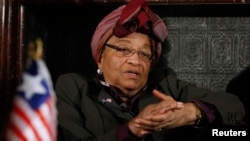The presidents of Liberia, Guinea and Sierra Leone are appealing for over $3 billion to help their countries recover from the Ebola epidemic which killed more than 11,000 people and devastated their economies.
Liberia's President Ellen Johnson Sirleaf told a U.N. conference Friday that the "world has a great stake in how we respond to this global threat." She said the money would help the people of the three West Africa countries to rebuild their lives.
Guinea's president Alpha Conde called for debt cancelation for the three countries and Sierra Leone's President Ernest Bai Koroma warned against complacency now that the epidemic is on the decline.
The theme of the two-day conference is about getting to zero cases of Ebola, staying there and then moving into the recovery phase.
The U.N. said that the three West African countries would be seeking about $3.2 billion in financial commitments for the next two years, but Johnson-Sirleaf said the subregional plan for recovery would be closer to $4 billion.
The U.S. ambassador to the United Nations, Samantha Power, said "it would be a grave mistake to believe our work is finished when this outbreak ends." She said the international community "must also lay the foundations to prevent" the next outbreak.
Johnson-Sirleaf states case
Speaking on behalf of the Mano River Union, which includes Guinea and Sierra Leone, she called on the international community to cancel more than $3 billion of their debt.
“There is no doubt that cost is high [and] the resources required significant. ... Is this asking too much? We say no, because a strong Mano River Union can be a formidable force for recovery and resilience in the subregion,” Johnson-Sirleaf said.
In the past year, Ebola has infected more than 27,000 people and killed 11,000 in West Africa. The epidemic has recently slowed dramatically, with about 30 new cases identified each week. Liberia had been declared Ebola-free, but lost that designation after a handful of new cases appeared. Guinea and Sierra Leone have not yet gotten to zero cases.
U.N. Secretary-General Ban Ki-moon said that the U.N. mission created last year to help West Africa battle Ebola would begin shutting down next month, but that support would continue through the World Health Organization and U.N. country teams.
He urged countries and financial institutions to be generous with their support, noting that the impact of Ebola has been far-reaching, eroding progress on peace and development.
International financial institutions and individual countries began announcing their pledges Friday afternoon. The United States is contributing $266 million. Total commitments were not immediately available.
Genetic findings
In another development Friday, tests on the recent Ebola cases in Liberia show that the virus is genetically similar to the strands that infected people in the region more than six months ago.
Health officials say the findings mean that the new outbreak is probably not due to the virus entering Liberia from neighboring countries. They say the transmission was likely either undetected for weeks or was reactivated by an Ebola survivor.
Ebola is thought to be able to survive no more than 21 days in the blood. However, scientists say the virus might be able to survive for months in semen and some soft tissue.




